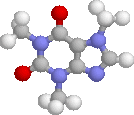

| Strona główna |
| Zespół |
| Badania |
| Aparatura |
| Seminaria |
| Publikacje |
|
Nasze konferencje |
|
Aktywność konferencyjna |
| Projekty |
| Programy |
|
Najbliższe wydarzenia |
| Linki |
| Kontakt |
|
|
|
od 2020-09-20 |

Authors: Jurga J., Woźniak-Braszak A., Fojud Z., Jurga K. |
Title: Proton longitudinal NMR relaxation of poly(p-phenylene sulphide) in the laboratory and the rotating frames reference |
Source: Solid State Nuclear Magnetic Resonance |
Year : 2004 |
Spin-lattice NMR relaxation times T-1 in the laboratory frame and T1 as well as Toff in the rotating frame off-resonance were employed to the study of molecular dynamics of both pristine PPS and thermally treated poly(p-phenylene sulfide) (PPS). The temperature dependence of T-1 was exponential in the whole temperature range studied, whereas T1ρ only in low temperatures. In the high temperature range the distribution of relaxation times T1ρ and correlation times tau(c) as well as activation energy E. was observed. The distribution of activation energy determined from T-1 minima at 15 and 30 MHz and from low temperature slopes of T1ρ dependence as well as from spectral density functions (estimated from proton off-resonance technique) was attributed to the reorientation of phenylene groups around the sulfur-phenyl-sulfur axis in amorphous and crystalline phases of PPS. Furthermore, it is suggested that an additional relaxation mechanism related to interactions of protons with paramagnetic centers is operative in a low temperature range. After thermal treatment of PPS the low temperature minima disappeared and the relaxation times shortened in the low temperature regime. Both these facts were attributed to an increased contribution of spin diffusion in the relaxation process. |
|
|
Zaktualizowano: podstrony 2025-12-13 / bazę danych: 2025-12-14 by Webmaster: Zbigniew Fojud